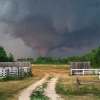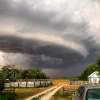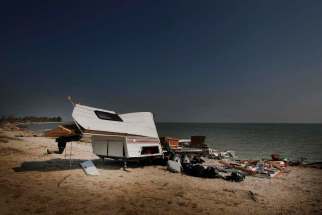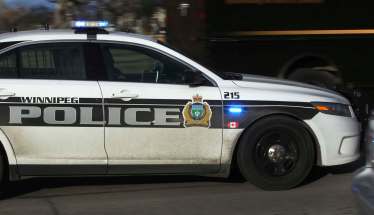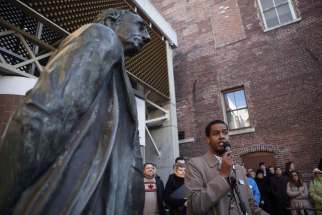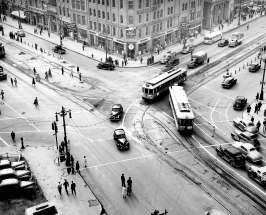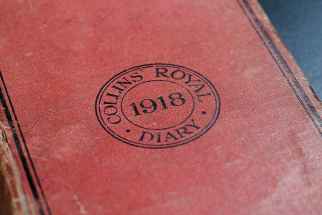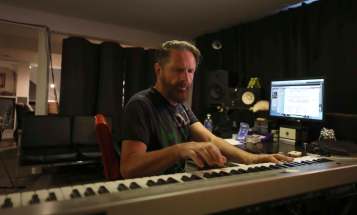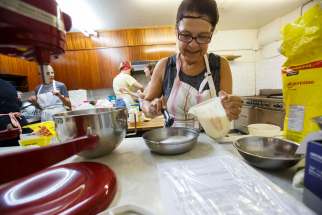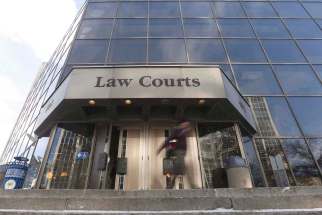‘Just a bunch of miracles’ Residents of Alonsa share their stories of survival after a powerful tornado killed one of their own and blazed a path of destruction through their community
Read this article for free:
or
Already have an account? Log in here »
To continue reading, please subscribe:
Monthly Digital Subscription
$0 for the first 4 weeks*
- Enjoy unlimited reading on winnipegfreepress.com
- Read the E-Edition, our digital replica newspaper
- Access News Break, our award-winning app
- Play interactive puzzles
*No charge for 4 weeks then price increases to the regular rate of $19.00 plus GST every four weeks. Offer available to new and qualified returning subscribers only. Cancel any time.
Monthly Digital Subscription
$4.75/week*
- Enjoy unlimited reading on winnipegfreepress.com
- Read the E-Edition, our digital replica newspaper
- Access News Break, our award-winning app
- Play interactive puzzles
*Billed as $19 plus GST every four weeks. Cancel any time.
To continue reading, please subscribe:
Add Free Press access to your Brandon Sun subscription for only an additional
$1 for the first 4 weeks*
*Your next subscription payment will increase by $1.00 and you will be charged $16.99 plus GST for four weeks. After four weeks, your payment will increase to $23.99 plus GST every four weeks.
Read unlimited articles for free today:
or
Already have an account? Log in here »
Hey there, time traveller!
This article was published 10/08/2018 (2677 days ago), so information in it may no longer be current.
ALONSA — There are fuel tanks in the water. There are hay bales in the water. There is a chunk of rusted something-or-other bobbing in the water, but from the debris-strewn ribbon of beach, it’s hard to tell just what it is.
There was even a late-model Dodge Ram in the water, flung there by the tornado as it carved a path eastward. The truck spent four nights marinating in Lake Manitoba, before a tow crew hauled its crumpled bulk onto sand.
And those are just the things residents here know for sure are in the water. There are other things, too, hidden under the placid grey surface. Entombed there for some future recovery effort, though they’ll never recover it all.
The roof of Russell Cabak’s house, for instance. Where the hell did that thing go?
It was there, until suddenly it wasn’t. Cabak, who has farmed cattle here for over a half-century, tells the story again: when the tornado struck, there were 14 people huddled in the basement, braced with their heads down.
Cabak says his son-in-law, Bill, was "the only one brave enough to look up" as the house groaned.
What Bill saw: One minute, the old house sat solidly above them, the way houses do. Then it lifted a little, like some great inhale — and then there was nothing. Just an angry sky, spitting rain and bits of hail on their heads.
"Poof, it was gone," Cabak says. "Instantly. Snap your fingers, and it was gone."

Nobody knows where the roof went. They haven’t found it yet. So it’s probably in the water, too.
This is what the end of the world looks like, in movies. But for most people struck by the tornado that shrieked through the Rural Municipality of Alonsa on the evening of Aug. 3, the world didn’t end. Most escaped with their lives, but gained this mess.
It is a tragedy, yes. One man, 77-year-old Jack Furrie, was killed when the tornado ravaged his house. He was the first person to die from a tornado in Canada in seven years — and everyone here knows it could have been worse.
It’s Wednesday afternoon. It’s been five days since the tornado roared over, howling like a freight train, cloaking the air in dust. Five days since Cabak’s roof vanished, and since shrieking winds snapped poplar trees like pencils.
In the days since, authorities rated and then upgraded the tornado’s power. On Monday, they declared the 800-metre-wide twister an EF4, the second-most violent class of tornado, one of just two to strike the world this year.
"I never want to see one, and why the heck it had to come here, I don’t know," Cabak says. "And to come right over top, what’s with that?"
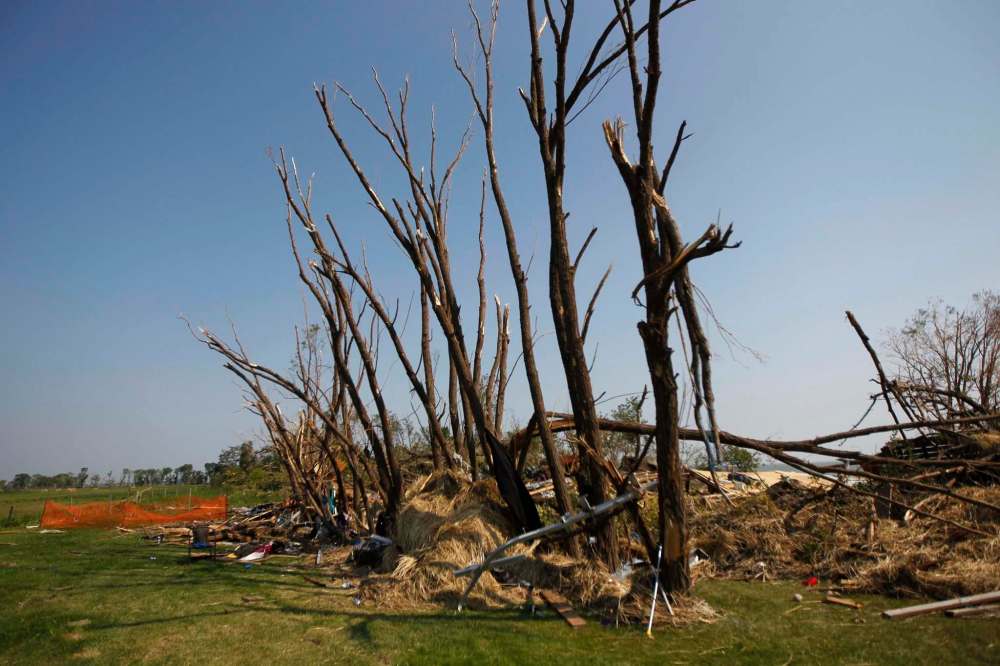
Because this little corner of Canada isn’t usually a place where many big things happen. True, there was the devastating flood back in 2011, when the province sent water from the Portage Diversion surging into the lake.
It took months to recover from that. Years, even. But for the most part, life around here rolls onward the same.
Now, this community is suddenly host to a major unfolding story, and people are streaming in to play their part.
Journalists have been out here. So have a handful of looters, and a few looky-loos. Various officials from various government departments have been out here, traipsing through the wreckage with their clipboards and cameras.
Even Premier Brian Pallister was out here, which "shows at least he gives a shit," one resident says.
In headlines, the story inches forward. Cellphone service out here is notoriously bad; many residents didn’t receive text warnings from the province. It took days for the RM to hire security to guard smashed houses.
Yet residents here are used to making do with what they have, together. It is a quiet place. Most folks who live around here know each other; it’s the kind of community where everybody turns to wave at a visiting stranger.
So in the days after the disaster, they pulled together. On Saturday morning, one week ago, with power still out in the town of Alonsa, a neighbour brought a generator to Frank Chen’s convenience store to help keep the freezers running.
Chen, in turn, donated bottles of ice-cold water to the cleanup effort out east, closer to where the tornado had carved its worst swath of destruction as it sped towards a strip of sandy beach. They were met with gratitude.
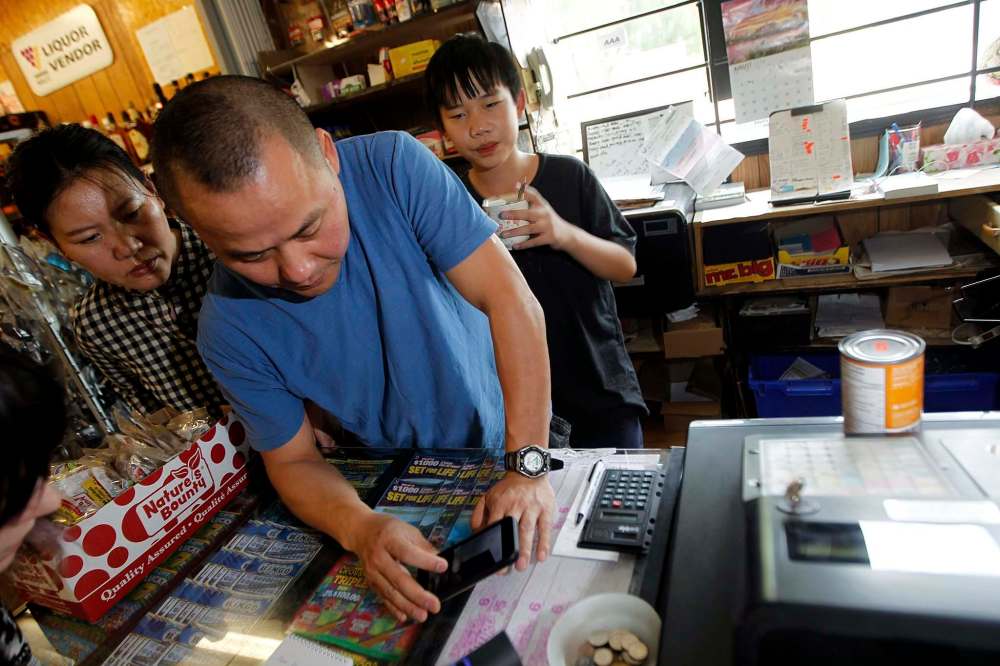
There were helpers from outside the community, too. One day after the storm, dozens of Mennonite volunteers rolled in from Ontario with Christian Aid Ministries. They brought heavy equipment, and combed fields of debris.
Neighbours brought food. People showed up to help clean. And they looked at the devastation, and then at each other, and said things to affirm they would get through it together. Things like, "Well, what are you gonna do?"
Besides, they’ve gotten through a disaster before. They’ll get through this, too. But at what cost?
“We’ve been building it up for 52 years, and it got wiped out in about two minutes.”–Russell Cabak
Cabak settles into a white plastic lawn chair, his back to the edge of the void where the basement used to be. All around him is destruction. The trees in the yard are gone. A family cottage, gone. His truck, hurled onto the beach.
And about 250 hay bales he had stashed around his property vanished. That’s no good in a drought year, he says: "They say hay is worth the price of gold this year." So this winter, he’ll probably have to ship off all of his cattle, too.
None of that is easy. But it happened, and now they’ve got to pick up the pieces. What else are you gonna do?
"We’ve been building it up for 52 years, and it got wiped out in about two minutes," he says.
***
The beach, Margaret Bruce Beach, is named after its first owner. She died in the 1950s, when a train struck her vehicle.
After that, the beach campground eventually passed to the province. For a time it languished, untended.
So about 25 years ago — or more, he can’t quite remember — Margaret’s grandson took over the place. Jimmy Bruce is his name, and from the start he set about fixing up the cozy campground where his grandma once lived.

"The first few years were bad, because we had quite a few young kids, and they’d party all night, and yell, and holy mackerel," Bruce says. "You’d tell ’em, ‘OK, it’s 1 a.m., time to shut ‘er down.’ Three o’clock, they’d start up again."
Yet Bruce was forgiving; after all, he says, he remembers being a young man once, too. And in time, those rowdy kids grew up, calmed down and had families. Today, some are among the beach’s crew of 60 core campers.
It’s a close-knit bunch, a campground and social club rolled up in one. Campers help out around the beach; in turn, Bruce and his wife, Crystal, go easy with rules. As long as it doesn’t bother anyone, Crystal says, "it’s OK with us."
So their lives are rooted here, on this sandy stretch. For instance, Crystal points to the mangled stump of an old tree; her best friend camped near that tree, spending long afternoons under its boughs, until she died last year.
There’s nothing left of the tree now. The tornado obliterated it along with a slew of campers, a few wooden structures, the wall around their toilets. What remains: a beach strewn with broken detritus of happier times.
"This was a little piece of heaven," Crystal says, as she picks through the wreckage. "It was so peaceful. Everybody knew everybody. We were all friends and neighbours, and we all had a really good time here."
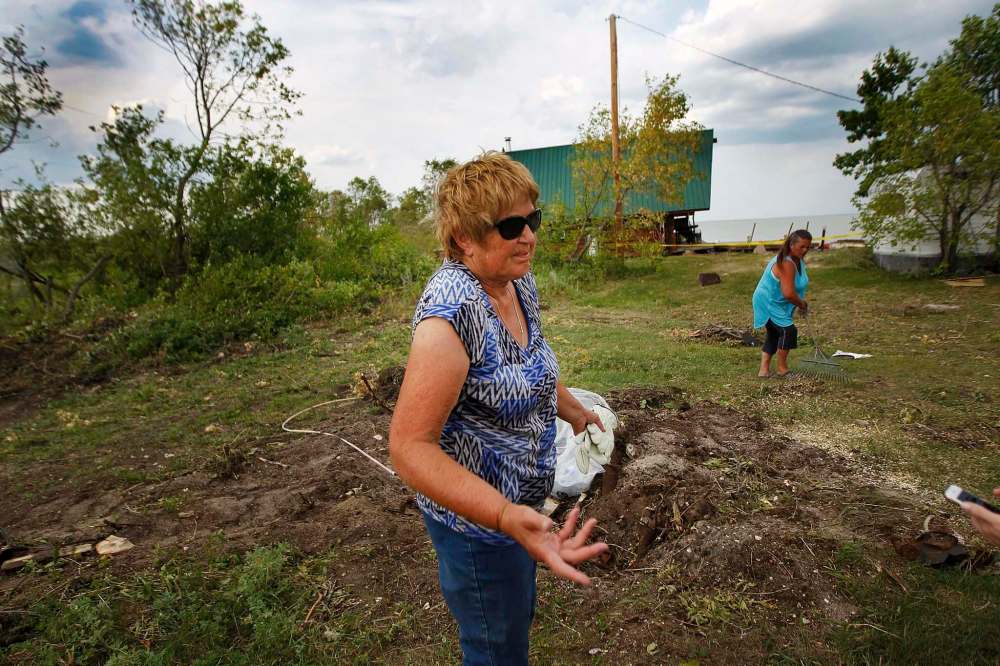
They are lucky. Nobody died on the beach, and nobody was seriously injured. There were a few close calls, though. One camper managed to wrangle the family dog into a truck, mere moments before the tornado smashed their trailer.
But they got out, mostly. When the tornado struck, campers fled to safety, racing for shelter at nearby houses.
As they drove away, they called out to Bruce to come with them. He didn’t. Instead, he stayed put in the rickety wooden shack that serves as the campground’s office, hunkered down in a small vestibule between two rooms.
The wind roared, battering the walls. The windows blew out. The entire structure started to lurch forward.
"It was here, and what could you do then?" Bruce says. "You’d made your decision to stay. You couldn’t run for it."
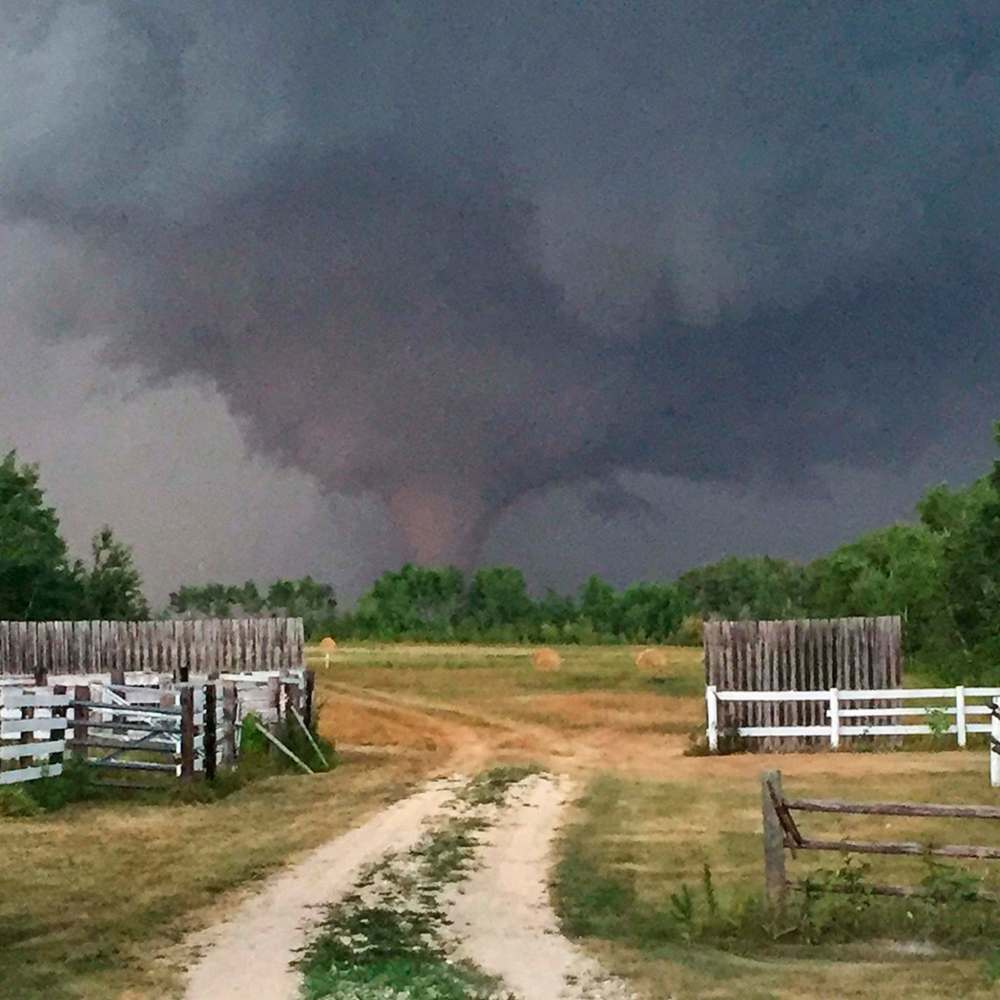
When the wind subsided, the shack was battered but intact. It was saved, perhaps, by the hydro pole that was standing — well, now it’s leaning — against the structure’s side. That probably jammed it in place, Bruce thinks.
Otherwise, the shack probably would have ended up in the water, too, and maybe taken him with it.
While this was happening, Crystal was at a church meeting in Amaranth, about 35 kilometres south. When the furious purple-black sky subsided, she sped towards the beach, passing debris from ruined houses on the way.
"When I saw the emergency vehicles, all the lights flashing, I was sure there would be…" she starts to say.
Her eyes blink back tears, and her voice fades away.
But she found her husband there, in the wreckage, unscathed. She was relieved, yes, and a little mad at him, too. But she was not surprised, she says with a smile. He’s stubborn. He doesn’t listen to anybody.
"A captain has to go down with his ship," Bruce told her, after it was over.
"Glad I’m just the first mate," she replied.
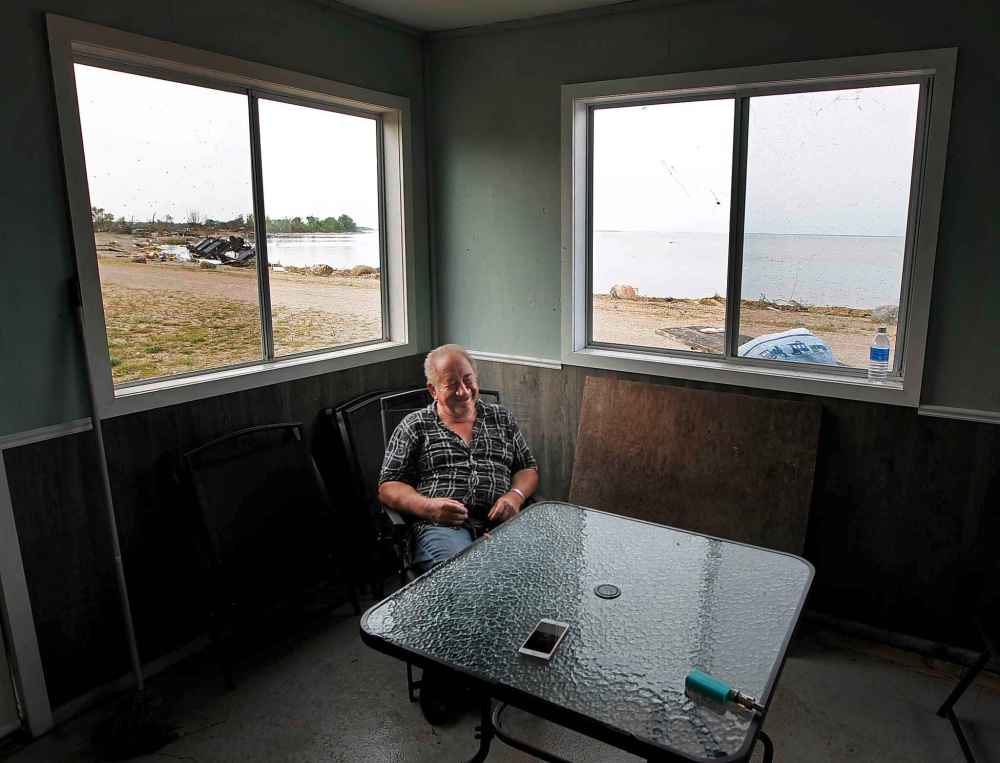
Talking to Bruce, you get a sense of what compelled him to stay. This territory runs deep in his blood. He has a cattle farm a short drive up the road; he grew up nearby, just 20 kilometres north, in the community of Kinosota.
"You never heard of it?" he says. "Well then, you didn’t take your history class."
You see, he explains, one of the first Hudson’s Bay Company trading posts was up there, called Manitoba House. A community sprung up around it, home to a handful of big Métis families who have mingled there for generations.
For much of that time, the region was thriving. When Bruce was young, the town of Alonsa had three grocery stores. Nearby, there was a hall they called the Plywood Palace, where youth flocked for Saturday night dances.
That was really all they had for entertainment, Bruce says. As a kid, he thought it must be the biggest hall around.
The years turned. The trapping economy faded away; the communities around the lake steadily dwindled. Now, there’s little industry around here to keep workers; just rocky pasture and, closer to Amaranth, some crop land.
"Nowadays, we can’t keep any of the kids home, because what do we got?" Bruce says. "It’s all over the place. Not only here."
Yet the families who stayed carved out something special. For Bruce, it’s the campground. He is 75 years old, though people always remark that he seems younger; mostly, it’s just that he never really seems to slow down.
"Life has been good, really," he says, chatting in the spartan interior of the beach office. "You keep active, you keep young. But if I retired, if I got rid of the cows, I’d have nothing to do. Then I’d probably get old."
And there’s always something to do around the beach. When the flood struck in 2011, it took over a year for the campground to recover; even this summer, the Bruces were still working on fixing damage to the beach’s toilets.
Now, they’ll have to dig out from another disaster. This one is shot through with grief: Bruce was good friends with Furrie, who died. They’d gone to school together, and both served on the local Manitoba Metis Federation chapter.
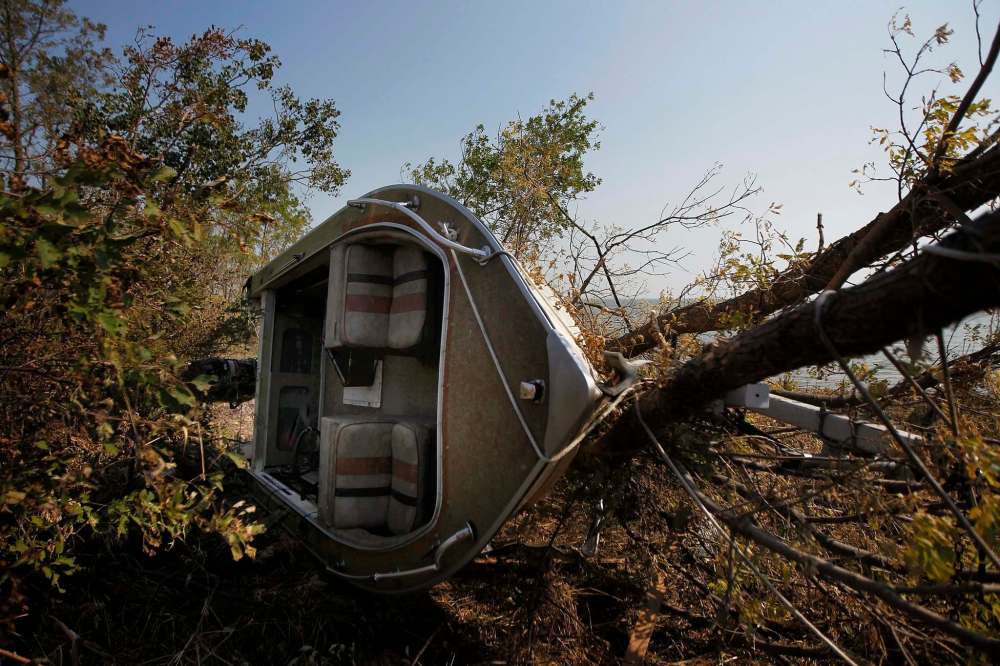
But then it comes back to the thought that it could have been worse, in so many ways. The work that lies ahead of them now, they know how to deal with. It’s just effort, just work, just picking up all the mangled bits and pieces.
That was Bruce ‘s first thought when he saw it, after he knew nobody on the beach had been seriously injured.
"Just another cleanup," Bruce recalls thinking, and shrugs his shoulders. "Another chore we gotta do."
***
Russell Cabak has been talking about what happened, a lot. He talks about it to neighbours. He talks about it to friends. When he needed to talk about it more, he called up a Winnipeg radio station one morning and offered to talk to them.
"Want to hear a story about one of the survivors?" he said, and as a matter of fact, the radio host did.
The talking helps, he says. When he talks about it, he feels a little bit better. It "gets the stress out, and whatever," because there’s still no way to wrap his mind around what happened in that basement, and his family’s survival.
He remembers one moment, huddled in the northwest corner. The house was his mother’s house until she died about 25 years ago. Recently, his three kids used it as a cottage, and his five grandkids loved to play in its yard.
Now, as the tornado bore down on the property, the old house’s basement became their last, desperate refuge. Cabak — 77 years old and still spry from his work cattle farming — cradled some of his grandkids under his body.
There was noise. Wind. Chaos. At some point, the water heater beside them fell over. At some point, the basement’s cinder block walls began to collapse. At some point, a flatbed trailer crashed into the basement.
"OK, I’ve lived my life," Cabak thought, then. "OK, this is the end of us."
When it was over, all that remained of his mother’s house was a gaping wound in the ground. Everything else had been smashed to pieces; somehow, 14 people had found the one spot in the basement that allowed their survival.
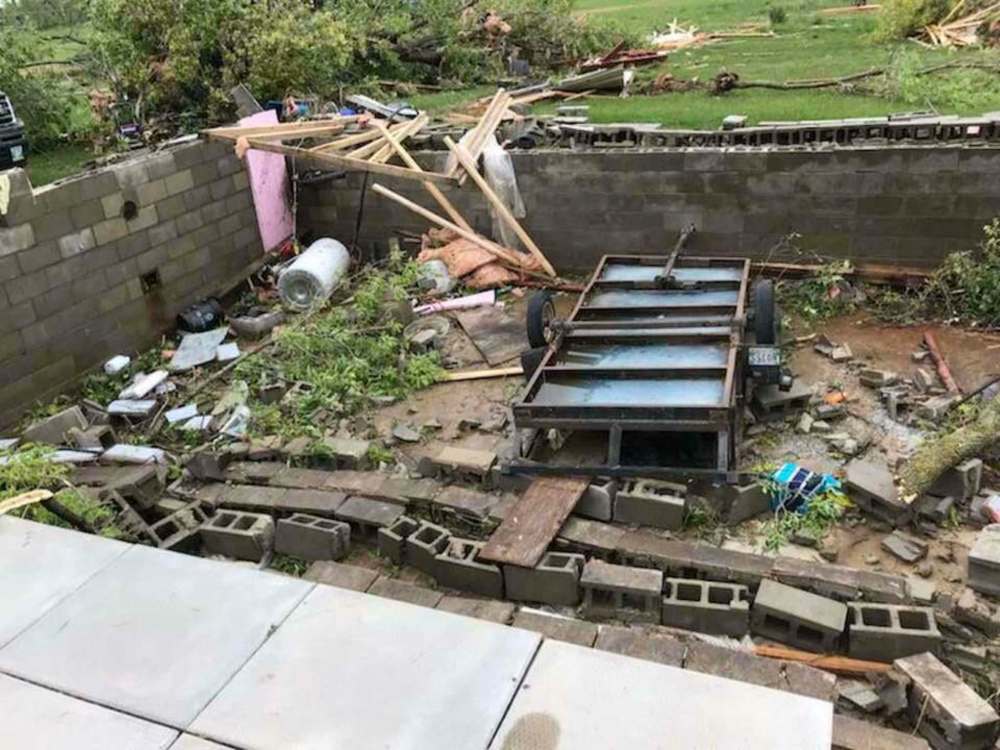
Nearby, one of Cabak’s sons had been caught outside when the tornado struck. "He’s got a hard head, like his dad," Cabak says. The furious winds hurled him onto a pile of debris, but he, too, walked away from the rubble.
Even the grandkids’ dog, which vanished during the tornado, soon turned up in the yard — terrified, but alive.

"Another miracle," Cabak says. "It was just a bunch of miracles that day. It’s hard to believe."
Within days, the story of the Cabaks’ survival had made news across Canada. The survivors gave interviews, repeating the terrifying details for reporters; Cabak figures it might help teach people what to do in a tornado.
“Maybe in the future, if it saves one life, it’ll be worth it," he says.
Still, there’s something about the ordeal that Cabak keeps coming back to, that he thinks deserves more attention. He turns to his cousin John, who’s dropped by for a visit. John’s family was part of the group in the basement.
"When I saw this on Saturday, I couldn’t get over it," John says, his voice choking up at the thought of it.
Cabak nods. So why, he wonders aloud, did one media outlet visit, but not run photos of the miraculous basement? Isn’t what happened here more important than some of the images that did make the news?
"It’s a little more important than the toilets at Margaret Bruce," John agrees. "No offence to Margaret Bruce."
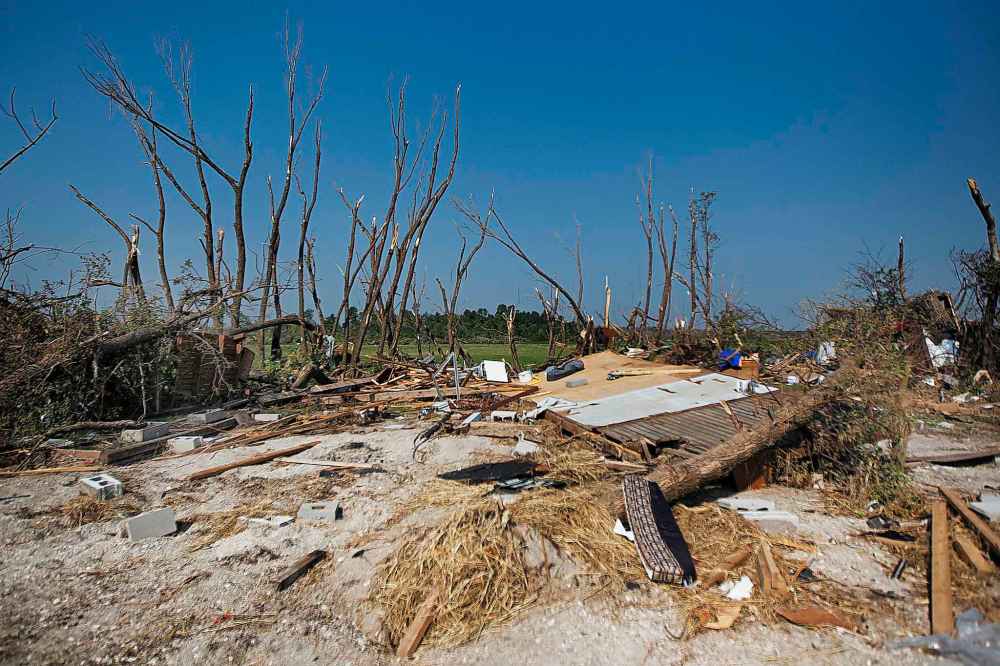
What Cabak is getting at, what he’s still trying to understand, is the big question: Why did his family survive a house being plucked away right above them? Why did Furrie die, while others walked away from destruction?
There is a bit of commotion; five days after the tornado, inspectors from Cabak’s insurance company had finally arrived to check out the damage. As Cabak walks off to meet them, his son, Vaughan, lingers for a few minutes.
"A lot of people here have been thinking more about faith," Vaughan says.
In the days since the tornado, Vaughan tried to work out how his family survived. He gestures with his hand; there was a truck that flipped over there, and that hydro pole, and then you see that thick, tall bush just over yonder…
That night, he’d parked his truck next to the house, underneath a big tree. It was supposed to hail that night, and he wanted to protect it from damage. So all of those little things put together made just enough of a wind barrier.
"It’s a calamity of lucky things that lined up to get us out of that basement," he says.
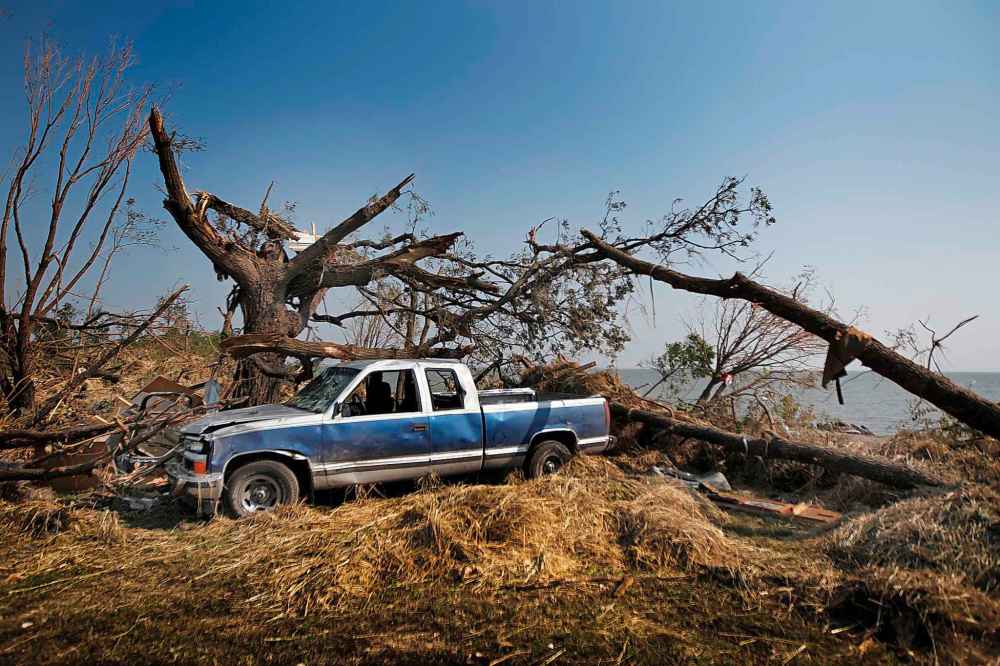
There is no other way to explain the violence of nature. It is capricious. The tornado tossed the world into chaos, with no obvious pattern to its damage or victims. You can work out the angles, but you can’t quite grasp the luck.
On the beach it tossed entire camper trailers together, like a furious toddler smashing blocks. Another trailer nearby is almost wholly untouched; its owner gestures to red flowers still dangling brightly from a hanging pot.
It’s the same story on Cabak’s property. His mother’s house was wiped clean off the face of the Earth; in the yard, his son’s ATV wasn’t even tipped over. A bunk house nestled nearby survived with only a handful of bent shingles.
And there are stories like that, all the way from the beach to the town of Alonsa.
Along the tornado’s scar, the word “if” hangs over residents’ conversations, glittering hard like frost at the leading edge of so many sentences.
So along the tornado’s scar, the word "if" hangs over residents’ conversations, glittering hard like frost at the leading edge of so many sentences.
If the Cabaks had huddled against any other wall of their basement. If the tornado had come in the dead of night, instead of evening. If that hydro pole hadn’t been standing next to Jimmy Bruce’s beach office — if not, what then?
In Alonsa that night, one resident watched as the tornado loomed to the south. She looked as the twister seemed to veer away from the township itself. If it hadn’t done that, she says, shaking her head, "our town would be gone."
Why did all of those "ifs" line up to save so many people? What happened there, that we need to understand?

One day, Cabak was talking to a volunteer from Christian Aid Ministries, who had arrived with backhoes to help clean up debris. The tornado was an "act of God," Cabak figured, not like the Manitoba-made flood back in 2011.
But then, the eternal question: Why would God both make the tornado, and save them from it?
"God didn’t create it," the volunteer replied. "It was the devil."
Remembering this conversation, Cabak leans back a little in the white plastic chair. If you blur your eyes to the wreckage of his picturesque homestead, the scene is peaceful: a warm breeze, rustling trees, green grasses.
"So it’s God fighting the devil," he says. "Here, I think, God won."
Still, before he wanders off to meet the insurance people, Cabak looks down at the hole in the ground. Then he looks over at two Free Press reporters and, in a relaxed, matter-of-fact voice, he offers them an "if" of his own.
"If we would’ve been upstairs, we would’ve been all gone," he says. "You would be here talking about the tragedy."
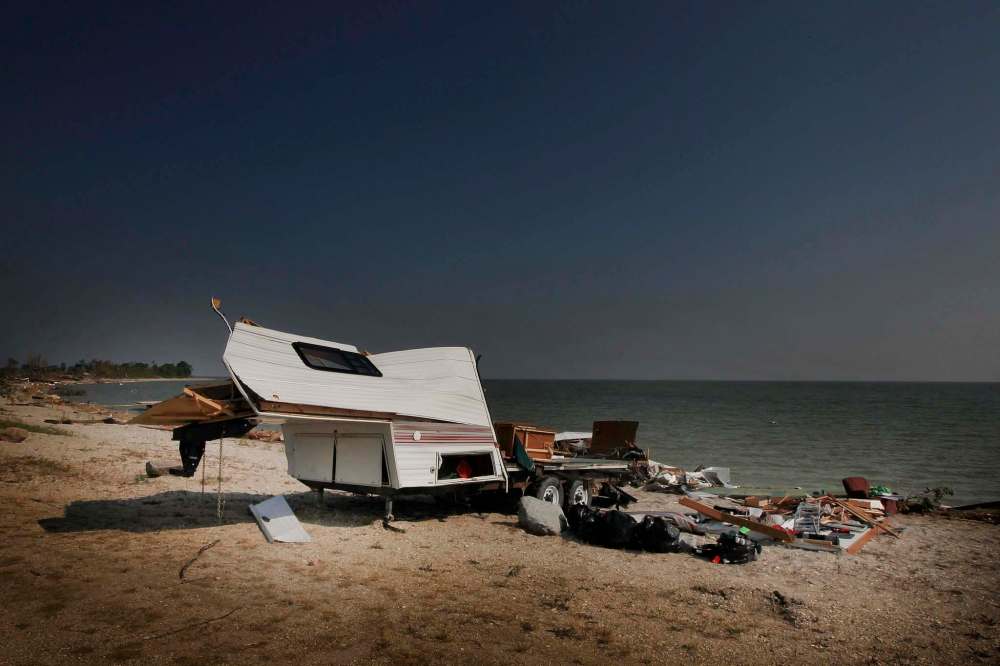
The damage — both human and material — could have been far worse. The mess will be fixed. But it’s the undiscovered countries inside of those "ifs" that will be harder to dig out from, much harder to make clean.
A jangle of seagull cries pierces the wind. Beside Cabak’s ruined basement, the beach’s resident flock is mingling in the grass. Wherever the birds sheltered during the storm, they all seem to have come through it unscathed.
All except for one gull, scampering up from the beach, dragging a bloodied and half-severed wing.
***
Truth be told, the jokes started floating around the community the day after the tornado. At Margaret Bruce Beach, the campers joked about the exposed toilets. At Cabak’s place, a joke that all it needed was a few coats of paint.
It may sound strange, because this is a serious thing, and to the people here most of all. Their friend died. They feared for their own lives. They watched so many things they knew and loved be snatched up and hurled away.
Yet there is something about humour that makes an affirmation: they are still here, and this won’t beat them.
In the beach office — the same shack that just days before saved his life — Jimmy Bruce is grilling hamburgers. Crystal Bruce and a couple of their regular campers are putting debris into piles so it can be scooped right up.
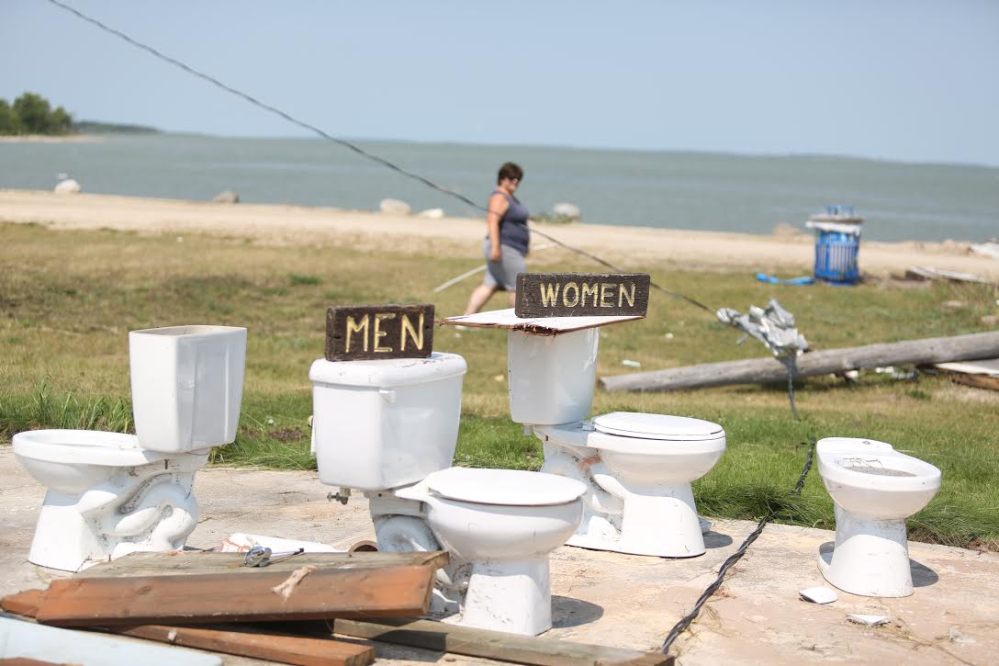
The cleanup is moving quickly. The night before, they managed to haul a smashed camper out of the water, getting it right-side-up on the sand. People keep coming by to pitch in, and their efforts are already visible.
"The flood was the bad one," Jimmy says. "I think this time the cleanup will be a little bit better."
The emotional wreckage may take longer to heal. When Cabak’s grandchildren left the property right after the tornado, they said they never wanted to come back. It was a paradise for them, once — maybe it will be again.
They’re going to come out soon, Cabak says. It might help them to see that the danger is over. What is left lying around is just stuff; it can’t hurt them. Meanwhile, every day that passes feels a little calmer, a little less stressed.
"Look at me," Cabak says. "I’m sitting here, and laughing and everything else. I got my chair, I’m set for the day."

And maybe, in time, they can find some resilience in it. Cabak told his daughter he wants to make shirts for the whole group, ones that say "We Survived The Alonsa Tornado." It could make for a good family photo, sometime.
There will be more good times. Bit by bit, life will go back to normal. The properties torn apart may take awhile to recover — "Probably another 52 years," Cabak says, "but I don’t think I’ll last that long" — but they will get there.
Still, it’s hard for him to say exactly what keeps them going. That’s another thing that will take time to understand.
"I don’t know," he says with a sigh. "This is the second tragedy. In 2011 we had the flood… so it’s perserverance, or whatever you wanna call it. But I just about had enough. I don’t think I can go through anything like this again."
melissa.martin@freepress.mb.ca
Our newsroom depends on a growing audience of readers to power our journalism. If you are not a paid reader, please consider becoming a subscriber.
Our newsroom depends on its audience of readers to power our journalism. Thank you for your support.







